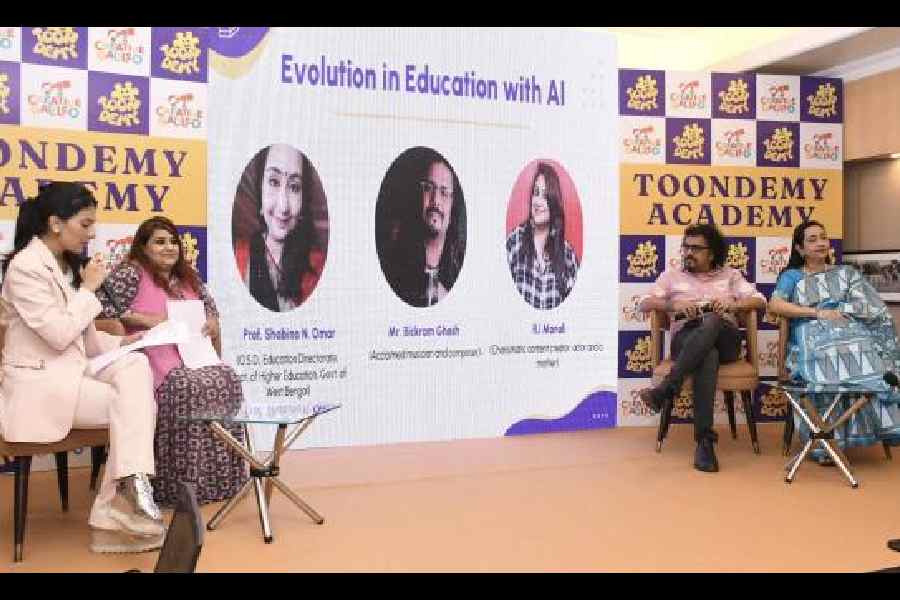Toondemy Academy organised a seminar on how AI or Artificial Intelligence can revolutionise education for Gen Z, at Tollygunge Club on November 4. Musician Bickram Ghosh was the chief guest of the event that was moderated by Prerna A Jhunjhunwala, founder, Creative Galileo.
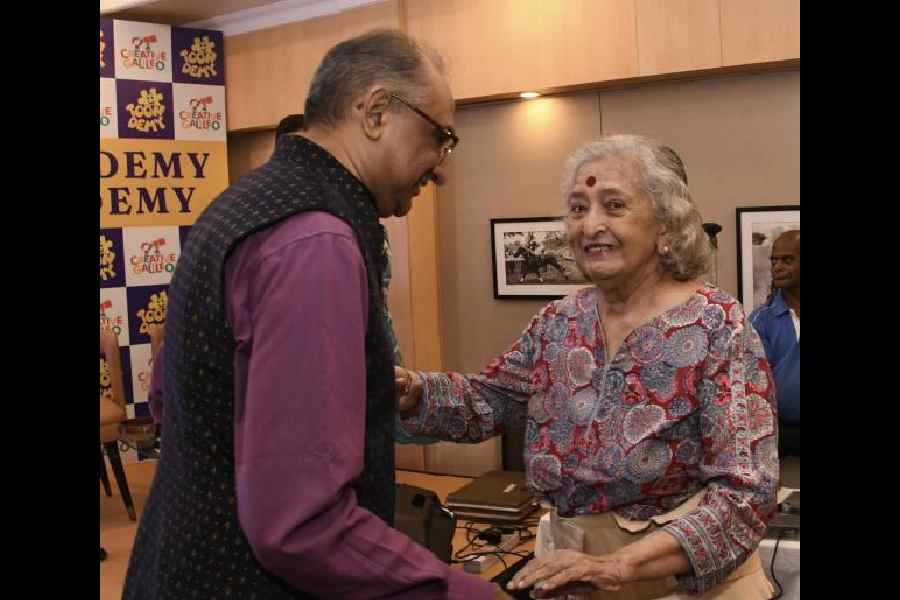
Imran Zaki, president, Faces, and Bharati Ray, ex-vice chancellor of Calcutta University. Imran said: “Artificial Intelligence is not a substitute for human intelligence, it is a tool to amplify human creativity and ingenuity. I believe AI is going to change the world more than anything in the history of humanity.”
The discussion started off with Shabina N. Omar, officer on special duty at Education Directorate, the Department of Higher Education, Government of West Bengal, reinforcing adaptability is the key to surviving in the age of AI. She asserted: “Artificial Intelligence has to be deployed through human intellect. We still have certain areas of choice and amplification because we must remember that it is a tool and maybe the users of AI will replace the non-users of AI. But let us not be so bleak and fatalistic and say that AI will replace humans. So what does AI do in education? I would say it works in education to personalise and enhance productivity tools, to create visualisation, to create access to task automation.”
Commenting on how AI will transform the music industry, Bickram Ghosh said: “You cannot take the science out of art or vice versa. If you think of the tabla, which is my instrument for life, there is a science to the making of the tabla. Interestingly, the science of making the tabla is approximately I would say 150-200 years old. Nothing has changed. They haven’t been able to better it. Here we still use a hammer and go bang-bang to tune the tabla. Many people across the globe tried to get little hooks, and all kinds of things have been tried. Nothing has worked so far. It’s still the hammer. So sometimes it’s a bit embarrassing. You have the microphone on and you are making a big noise like a woodcutter. That’s the way it is. The science was so good that it hasn’t been upped yet. Coming to AI, I am the first artiste in India to have had his metaverse made. And the metaverse could not have been created without AI. It is a one-stop interactive, immersive platform for anything Bickram Ghosh. I think AI is here to stay. And, of course, like any invention, any scientific breakthrough, it always comes with a group of people saying that ‘no’. It’s very interesting how the telephone today is the fulcrum of our lives.”
But how do we incorporate visual learning and immersive learning gamification in our classrooms today? Omar made an interesting observation. “It depends on the school, which strata of education, and the background of infrastructure we are looking at. To answer how to use the immersive experience and make learning enjoyable, it has to be through the hybrid mode. The four primary approaches to learning are visual, auditory, reading and kinesthetic (VARK). The way to immersive teaching and learning is to engage with the process very objectively and yet very inclusively and to make room for those who need a customised environment, as well as those who can match the general pace of the class. We have to make a judicious use of technology”.
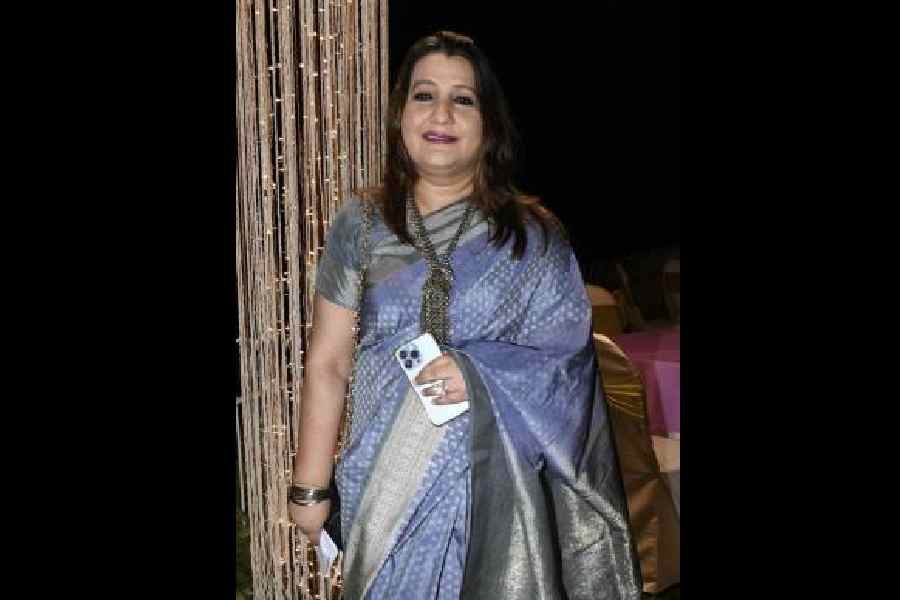
Neeta Kanoria, founder, Wings Academy, said, “AI is the need of the hour. And I am glad platforms like Toondemy are coming up where it is easier for children to learn visually. We cannot take away screens from kids these days. To make them use screens in a proper way is important. And it will not interfere with the traditional ways of learning. It will only help that format and kids to learn faster"
Speaking on what roles in the music industry will change, Bickram added: “That a certain section of musicians are going to be replaced is a bit of a scary thought. I think musicians will also have to take stock and figure out how they can continue to showcase their talent, even if they are going to be replaced by AI. If a machine or Artificial Intelligence takes over the part (of their job) that they actually do now, interestingly, on one level that has already happened, and it’s happened years back. For those who have heard the rumours, I am confirming it on the stage. For instance, we all thought that if you practised as a musician or a singer, you got to sing really well. You got to sing in the right pitch. You practise for years. I’m sure many of you do know that there is a pitch corrector machine now. All we do in the studios initially is to feel a bit guilty, but I don’t feel it any more because you keep doing something many times, you don’t really (feel guilty anymore). It’s been years since we started using the auto-tune. So what happens is the singer comes, sings the song in 20 minutes, half an hour, and there are maybe 12 notes which are off and very often we say, thik hai kar lenge. All we do is fix it. We switch on the pitch corrector and the song is completely in pitch. Technology is taking over.”
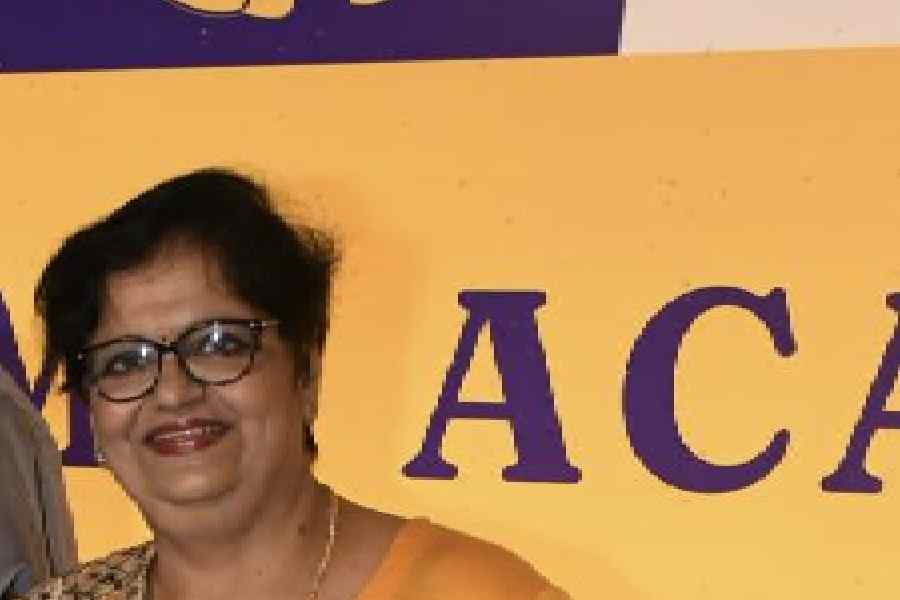
Loveleen Saigal, principal, Birla High School, said: “Almost 20 per cent of our lessons are designed keeping in mind AI. Anything new has its pros and cons. We have to sift the best of it and use its advantage. Today we cannot live without technology. The same is with AI. Either we live with it or we will be left behind”
He continued, “In the 70s and the 80s, there used to be big studios. And now how is music made? One person is sitting in a small studio, this person is called a programmer who sits with the keyboard and uses software that comprises simulated tools. So if you want to play a particular kind of piano, all you have to do is download that sound. You get that piano and you play the sound from the keyboard. So I’m letting you in on a secret. If you’ve watched the Byomkesh series, you will see an extensive use of the Pakhavaj, which is an age-old drum. It wasn’t the real Pakhavaj. I played it off of a Pakhavaj trigger on the keyboard. And I’m really good at it. That’s how you adapt and re-orient your brain. Because if I were to play the Pakhavaj, I would play it like a drum. But here I’m having to play with two fingers on the keys. So this is how technology is changing music. And it’s happening incredibly fast.
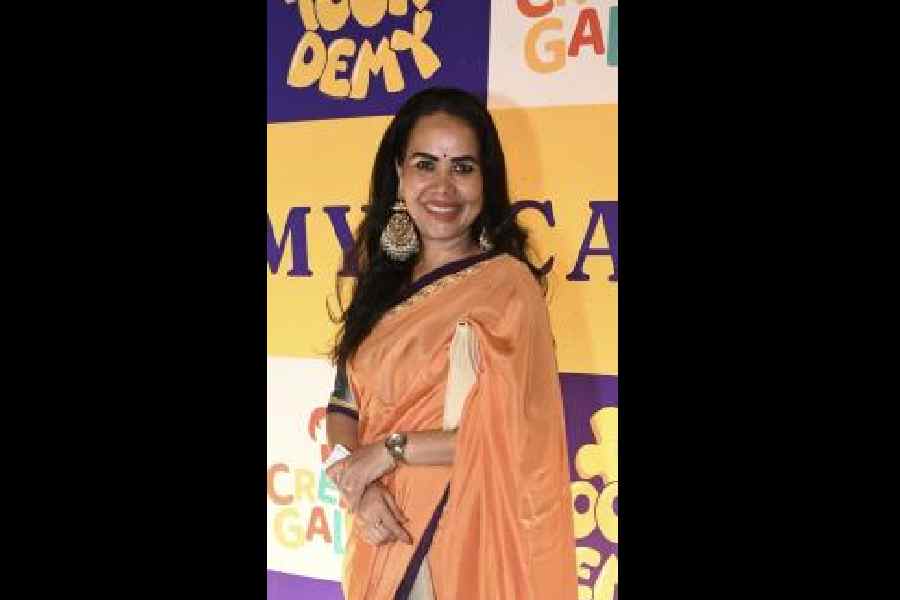
Jessica Gomes Surana, principal, Loreto Day School (Elliot Road), said: “We cannot have complete AI. Neither can we have complete traditional mode of learning. We as schools need to imbibe the good parts into our system and help it grow. It has to be like the right mix of ingredients. As someone who looks up to the concept of guru, I feel now gurus need to update and upgrade themselves”
Bickram believes in using technology to our advantage. “We have to look at the advantages of technology. They are humongous. A creative person needs to have a larger skill set now. He can move forward with artistry and aesthetics in that craft, just the modus of the craft has changed. For a man of my age, I have seen technology change an umpteen number of times. When we started out, there used to be LP record which interestingly is back again now, then came the cassettes, the CDs. And now it’s all redundant. It’s your phone now. Welcome AI!” he signed off.
